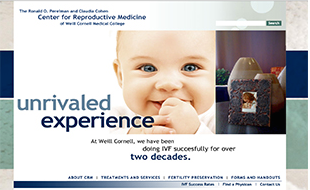A thousand thanks for helping us have our beautiful son. He is giving us more joy than we ever dreamed of. Anonymous
Cornell's Institute for Reproductive Medicine consists of the Center for Reproductive Medicine, which specializes in the female factor, and the Center for Male Reproductive Medicine and Microsurgery, which specializes in the male factor. The Institute's unique collaboration between male and female specialists allow the two teams to meet regularly to treat the couple, as opposed to only treating the male or the female. This innovative partnership has resulted in the highest pregnancy rates of any fertility center in the world.
Cornell's Center for Reproductive Medicine, specializing in female factor infertility, has staff comprised of preeminent medical, nursing, and scientific experts in in-vitro fertilization. Since 1988, more than 19,000 children have been born as a result of IVF cycles at CRM, and many of our patients have cycled elsewhere unsuccessfully before becoming parents because of collaborative combined male and female treatment at our Center. Our IVF success rates attest to the Institute's excellence in assisted reproductive technology in collaboration with our male factor reproductive urologists.
ICSI
Intra-cytoplasmic sperm injection (ICSI) is a procedure in which a single sperm is injected directly into an egg to achieve fertilization. The resulting embryo(s) are then incubated for three or five days before transfer to the patient, or may be cryopreserved.
ICSI is commonly used to treat male factor infertility due to low sperm count, poor sperm movement, or abnormally shaped sperm. ICSI is also used to fertilize oocytes that have been cryopreserved as part of a fertility preservation treatment ("egg freezing"), and in conjunction with testicular sperm extraction (TESE) and PGD/PGS.
Dr. Gianpiero Palermo, the Blavatnik Professor of Reproductive Medicine and Director of CRM's Andrology Laboratory, in 1992 was the first person to perform and describe ICSI. Dr. Palermo and his staff continue to refine the ICSI procedure in their ongoing research.
OI/IUI
Ovulation Induction (OI) is a fertility treatment often effective for women with the following conditions:
- Women who do not ovulate (anovulation)
- Absent menstrual period (amenorrhea) or irregular periods (oligomenorrhea) due to abnormal pituitary hormone levels, polycystic ovarian syndrome (PCOS), or other causes
- Hyperprolactinemia
- Other ovulatory disorders
Ovulation induction treatments frequently include intrauterine insemination, a procedure in which washed semen is placed directly in the uterus, in order to maximize the chances of pregnancy.
Ovulation induction patients at CRM are cared for by a clinical team that includes their physician, physician assistant, or nurse practitioner. Ovulation induction orientation classes, including a step-by-step walkthrough of the process and the opportunity to discuss any questions with a nurse, are held twice weekly at CRM's Upper East Side location.



